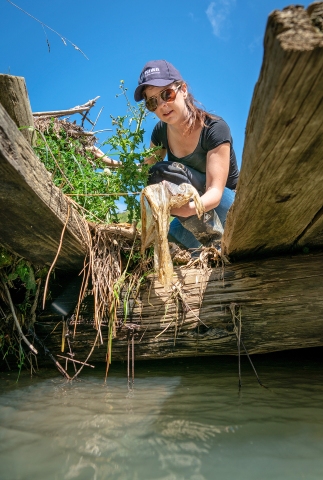It has been estimated that rivers export 4,000,000 tonnes of plastic to the sea each year but how this large mass of different plastic types and size fractions enter rivers and the subsequent fate; fragmentation (producing secondary microplastics), sediment burial, or downstream transport is not well understood and has profound implications for the mass estimates.
The issue
Plastic waste makes up a large proportion of the debris collected on New Zealand beaches, with single use plastics such a food wrappers and plastic bags being the largest culprits. Most of the plastic in the ocean originates on land, being carried to the estuaries and coasts by rivers. Managing this plastic on land before it reaches the river could be the key to stemming the tide of marine-bound plastics. In order to do this the project will focus on the following key questions:
- Where does all the plastic come from?
- How much and what types of plastics are carried by rivers?
The goal of this project is to understand the sources and fate of plastic pollution carried by urban rivers using the Kaiwharawhara Stream as a case study.
This knowledge will help us to improve our understanding of plastic pollution sources and pathways and identify key locations and seasons of plastic release into the environment.
The approach
The design of this research will draw on a ki uta ki tai approach—from the mountains to the sea—and consider the movement and impacts of plastic pollution along the length of the Kaiwharawhara Stream.
- 2018-19 Develop and test protocols for monitoring of macro (more than 5 mm) and microplastics (less than 5 mm) in freshwaters. In collaboration with Taranaki Whānui, develop a cultural monitoring framework to quantify the state of plastic pollution at culturally significant sites over time.
- 2019-20 Quantify the different ways plastics enter the stream. Evaluate these sources, including the type and amount of plastics they contribute, and how this contribution changes over time. Monitor plastic concentrations in water and sediment to understand seasonality of stream inputs and catchment characteristics which may influence where plastics accumulate.
- 2020-21 Assess how plastics change over time in the stream, breaking down into smaller pieces, and how this change is influenced by human modification to the stream environment. In collaboration with Taranaki Whānui, describe the impacts of different plastics loads at culturally significant sites on mana whenua values.
Outcomes and tools
This research will assist councils to identify the extent of plastic pollution transported through stormwater systems, littering and dumping and how this might be monitored and managed, such as through catchment stormwater management plans. Community-led monitoring methods will enable the public to monitor the state of plastic pollution in their rivers.
Through working with Taranaki Whānui, this research will assist in building cross-cultural understandings around the spatial and temporal impacts of plastic pollution on cultural values. It will also provide the opportunity to inform the Wellington Whaitua process.
By looking at river plastic concentrations over space and time and as a function of river characteristics, we will build better estimates of plastic inputs to the sea. Improved estimates will allow us to evaluate how well plastic reduction strategies are working.
Resources
An article: Scientist collects rubbish to rid rivers of plastics about Dr Amanda Valois' research project, appeared in the NIWA 2018 Summer Series.
Download an info sheet on the Plastic pollution processes in rivers research project [PDF 180KB]
The project is funded by the Ministry of Business, Innovation and Employment.
External people involved
- Dr Sally Gaw - University of Canterbury
- Dr Olga Pantos - ESR
- Mountains to Sea Wellington
- Taranaki Whānui ki Te Upoko o Te Ika
- Wellington City Council
- Greater Wellington Regional Council
- Stormwater360

